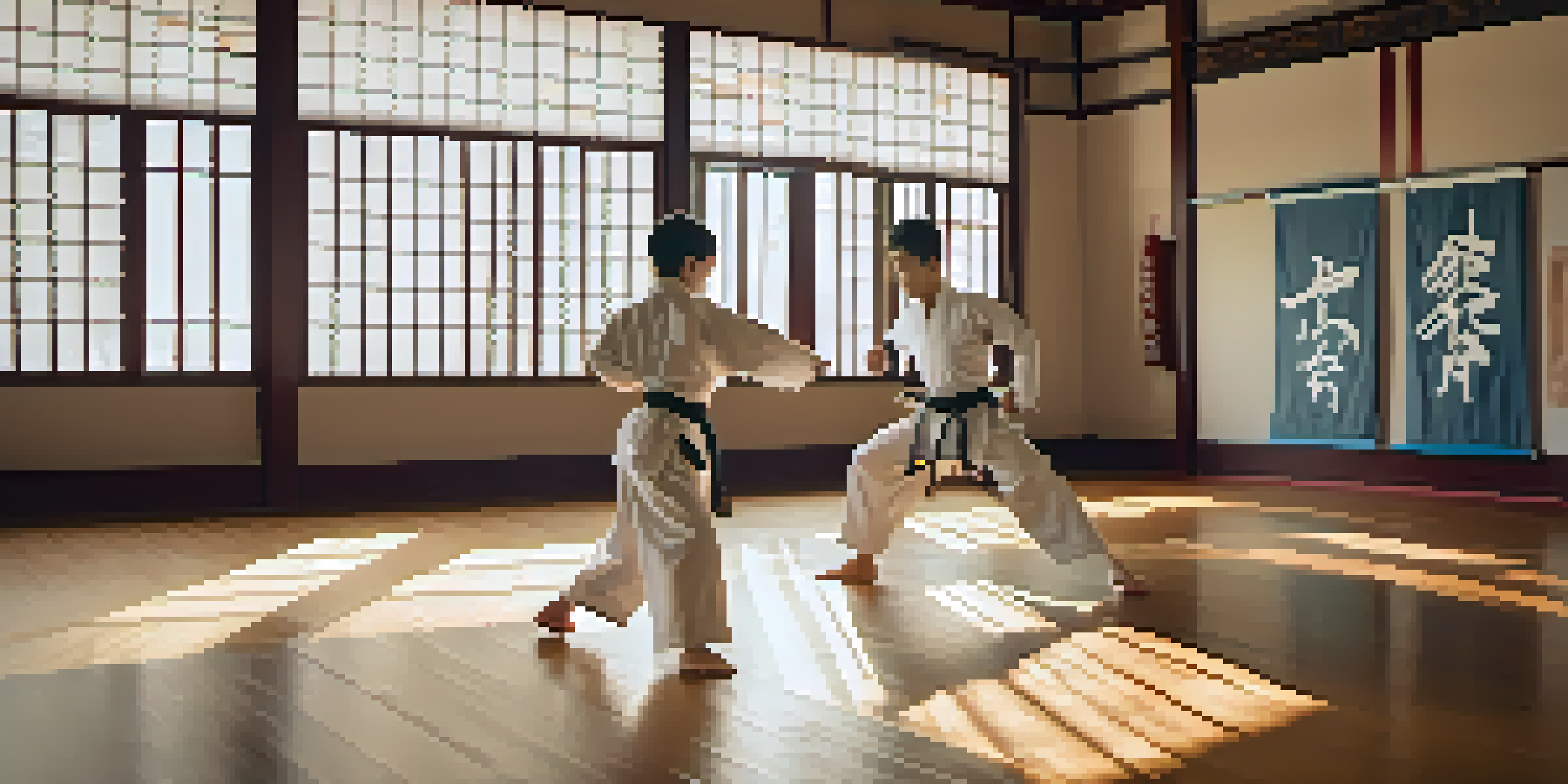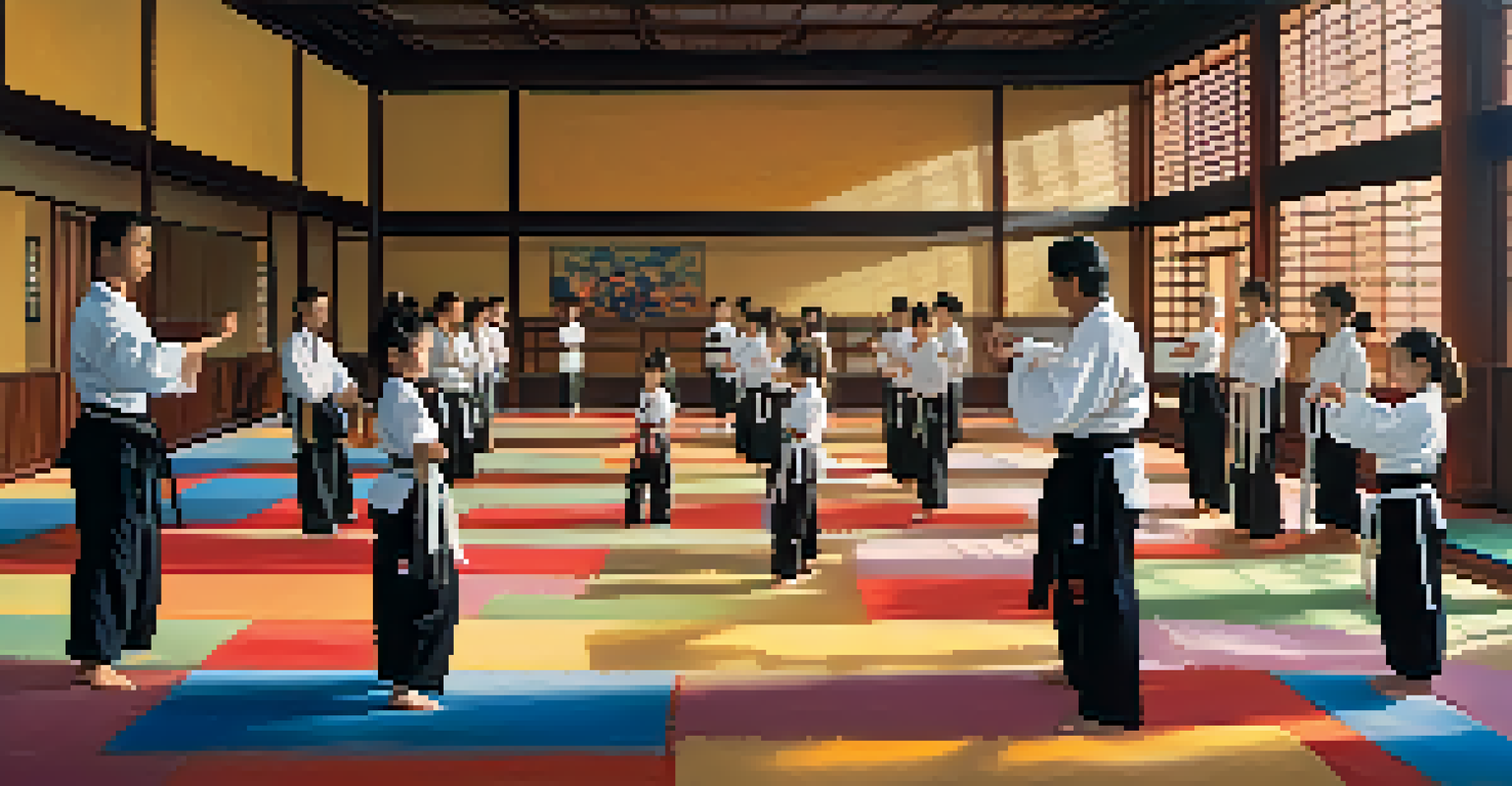Creating Positive Role Models in Youth Through Martial Arts

The Importance of Role Models in Youth Development
Role models play a crucial role in shaping the values and behaviors of young people. They offer guidance, inspiration, and a framework for what is possible. When youth have strong role models, they are more likely to develop confidence and resilience, qualities essential for navigating life’s challenges.
A mentor is someone who allows you to see the hope inside yourself.
In many cases, positive role models can come from various aspects of life, including family, teachers, or community leaders. However, the influence of mentors in structured environments, like martial arts, can be particularly impactful. Martial arts instructors often embody the very principles they teach, making them relatable figures for their students.
Moreover, the journey of learning martial arts involves overcoming obstacles and failures, providing a perfect backdrop for teaching perseverance. As youth see their instructors demonstrate commitment and growth, they begin to adopt similar attitudes, fostering a cycle of positivity and encouragement.
How Martial Arts Instills Discipline and Respect
Discipline and respect are foundational elements in martial arts training. Students learn to respect their instructors, peers, and the traditions of the martial art itself. This respect fosters an environment where positive behaviors can flourish, encouraging youth to internalize these values in their everyday lives.

The practice of martial arts often includes rituals, such as bowing or observing silence before class begins. These actions may seem simple, but they emphasize the importance of mindfulness and respect for the training space and community. As young practitioners adopt these behaviors, they naturally transfer these lessons into their interactions outside of the dojo.
Role Models Shape Youth Development
Positive role models guide young people, helping them build confidence and resilience.
Additionally, the discipline gained through martial arts training helps youth focus on their goals. The structured environment teaches them to set objectives, work towards them, and celebrate their successes. This sense of accomplishment boosts self-esteem, reinforcing the idea that hard work pays off.
Building Confidence Through Achievement in Martial Arts
Martial arts is a journey filled with milestones that boost confidence in young practitioners. From earning new belts to mastering techniques, each achievement serves as a building block for self-esteem. These small victories remind youth that progress is possible, which can be a transformative realization.
Success is not the key to happiness. Happiness is the key to success. If you love what you are doing, you will be successful.
As students grow and improve, they begin to see themselves as capable individuals, which can shift their mindset significantly. This newfound self-worth allows them to tackle challenges outside of the dojo with a more positive outlook. For example, a shy child who becomes proficient in a martial art may find it easier to participate in school activities or make new friends.
Moreover, demonstrating skills in front of peers or at competitions reinforces their confidence. The supportive atmosphere of martial arts classes encourages students to cheer each other on, creating a sense of camaraderie that strengthens social bonds. As youth support one another, they learn the value of collaboration and mutual encouragement.
Fostering Leadership Skills Through Martial Arts Training
Martial arts training is not just about physical skills; it also cultivates essential leadership qualities. As students advance in their training, they often have opportunities to mentor beginners, allowing them to practice communication and guidance. This mentorship experience is invaluable for developing empathy and responsibility.
Instructors frequently encourage students to take charge during practice sessions, fostering an environment where they can lead warm-ups or drills. These small acts of leadership build confidence and prepare young people for future roles in their schools and communities. The skills learned in martial arts can translate into effective leadership in various settings.
Martial Arts Foster Discipline
Training in martial arts instills discipline and respect, encouraging youth to internalize these values.
Furthermore, martial arts teaches students to remain calm and composed under pressure. This ability to handle challenging situations with grace is a hallmark of effective leaders. As youth learn to navigate the highs and lows of competition and training, they become better equipped to lead others by example.
Promoting Community and Belonging in Martial Arts
One of the most significant benefits of participating in martial arts is the sense of community it fosters. Students become part of a supportive group that shares common goals and values. This feeling of belonging can be especially important for youth who may struggle to find their place in other social environments.
The camaraderie built in martial arts classes helps young practitioners form friendships that can last a lifetime. Through shared experiences, such as sparring or group competitions, students bond over their challenges and triumphs. These connections often extend beyond the dojo, contributing to a supportive network in their personal lives.
Additionally, martial arts schools often engage in community service and outreach programs, further instilling a sense of social responsibility. When youth participate in activities that benefit others, they develop empathy and a commitment to making a positive impact. This involvement reinforces the idea that they can contribute to something greater than themselves.
The Role of Positive Reinforcement in Martial Arts
Positive reinforcement is a powerful tool in martial arts training. Instructors often celebrate students’ successes, big or small, which helps build a positive learning environment. This encouragement motivates youth to continue striving for improvement and reinforces their dedication to the practice.
For instance, recognizing a student's effort in mastering a difficult technique can inspire them to keep pushing their limits. The acknowledgment of hard work fosters a growth mindset, where students learn to appreciate the journey rather than just the outcome. This shift in perspective is crucial for their overall development.
Building Community Through Training
Martial arts create a sense of belonging, promoting friendships and social responsibility among youth.
Furthermore, positive reinforcement promotes resilience. When students face setbacks, the support they receive from instructors and peers helps them bounce back and try again. This culture of encouragement teaches youth that failure is not the end, but rather an opportunity for growth and learning.
Conclusion: The Lasting Impact of Martial Arts on Youth
The journey of youth in martial arts extends far beyond physical training; it shapes their character and outlook on life. By fostering discipline, respect, confidence, and leadership skills, martial arts creates positive role models who can influence their peers and communities. The values learned in the dojo often resonate throughout their lives, guiding their decisions and interactions.
As youth navigate the challenges of growing up, the lessons from martial arts provide them with the tools they need to succeed. The friendships formed, the achievements celebrated, and the sense of belonging all contribute to a well-rounded individual ready to face the world. The impact of martial arts is profound and enduring.

In conclusion, investing in martial arts training is not just about self-defense or physical fitness; it's about nurturing the next generation of positive role models. Through martial arts, youth learn the importance of integrity, perseverance, and community service, ultimately shaping a brighter future for themselves and those around them.